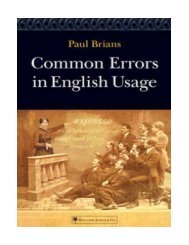url?sa=t&source=web&cd=3&ved=0CC0QFjAC&url=http://www.teachingenglish.org.uk/sites/teacheng/files/B369-Young-Learners-Activity-Book_v10
url?sa=t&source=web&cd=3&ved=0CC0QFjAC&url=http://www.teachingenglish.org.uk/sites/teacheng/files/B369-Young-Learners-Activity-Book_v10
url?sa=t&source=web&cd=3&ved=0CC0QFjAC&url=http://www.teachingenglish.org.uk/sites/teacheng/files/B369-Young-Learners-Activity-Book_v10
Create successful ePaper yourself
Turn your PDF publications into a flip-book with our unique Google optimized e-Paper software.
TeachingEnglish <strong>Young</strong> <strong>Learners</strong> <strong>Activity</strong> <strong>Book</strong><br />
Activities<br />
<strong>Activity</strong> 7: Calendars<br />
Giuliana Veruggio – Italy<br />
Age: All ages<br />
Maximum 15 minutes Large classes? Yes Mixed level? Yes<br />
Materials: A calendar page for each child.<br />
Organisation: Individual work.<br />
Aim: To revise vocabulary.<br />
Description: In this activity the children decide what new language they want to remember.<br />
Each child is given a new calendar page at the beginning of each month. Over the month they<br />
fill in the spaces on the calendar with new words that they choose themselves.<br />
Preparation: You will need to prepare a calendar page of the month for each child. You can<br />
make this on the computer or you can draw it. Make sure each square has a day and a number.<br />
Procedure<br />
1. At the beginning of each month, give each child a calendar page of the month with a square<br />
for each day.<br />
2. Every Friday (or on whichever day you choose), ask the children to put a new English word,<br />
perhaps with a picture or a translation in each square for that week. The words can be from<br />
work covered in class or the children can ask you for words they would like to know in<br />
English. As the children are working on their calendar weeks, go around the class and ask<br />
them to pronounce the words and tell you what each word means.<br />
3. At the end of the week, the children take their calendars home and learn the words<br />
they have written down. By the end of each month, the children should have learnt about<br />
30 new words and have a colourful record of their achievements.<br />
Notes<br />
This is an easy way to personalise learning as the children choose their own words to write in<br />
the squares. You can brighten up the classroom by displaying completed months on the walls.<br />
Alternatives<br />
• Children can write sentences instead of words.<br />
• At the end of each week/month, the children can write a story, trying to include as many<br />
words as possible. You can give a prize for the best story.<br />
• For more advanced learners, you can make the task more challenging by asking them to try<br />
to use words beginning with as many different letters of the alphabet as possible. You can give<br />
a prize to the child who uses the most different letters.<br />
20<br />
© British Council 2012





